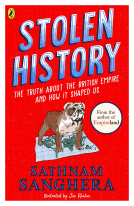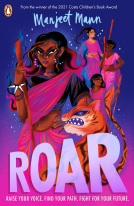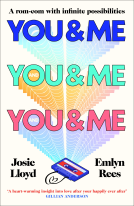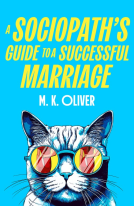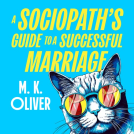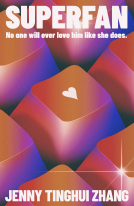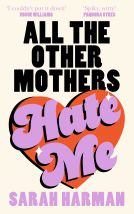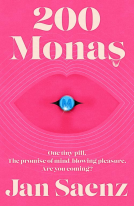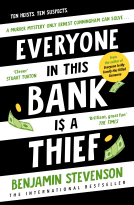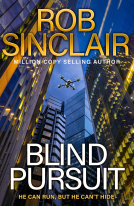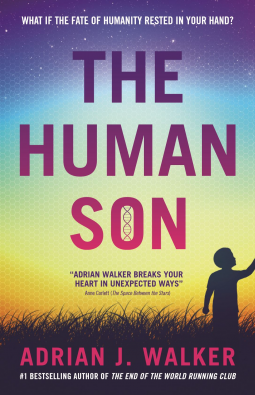
The Human Son
by Adrian J Walker
This title was previously available on NetGalley and is now archived.
Send NetGalley books directly to your Kindle or Kindle app
1
To read on a Kindle or Kindle app, please add kindle@netgalley.com as an approved email address to receive files in your Amazon account. Click here for step-by-step instructions.
2
Also find your Kindle email address within your Amazon account, and enter it here.
Pub Date 28 Apr 2020 | Archive Date 30 Jun 2020
Rebellion | Solaris
Talking about this book? Use #TheHumanSon #NetGalley. More hashtag tips!
Description
A startling, emotional, beautiful (and at times funny) book – one that feels like the best sort of science fiction, a book that should be enjoyed widely, a book that speaks of what it is to be human, a parent, and a child.
It is 500 years in the future and Earth is no longer populated by humans.
The new guardians of Earth, the genetically engineered Erta, have reversed climate change. They are now faced with a dilemma; if they reintroduce the rebellious and violent Homo Sapiens, all of their work will be undone.
They decide to raise one final child; a sole human to help decide if humanity should again inherit the Earth.
But the quiet and clinical Ima finds that there is more to raising a human than she had expected; and there is more to humanity’s history than she has been told.
A Note From the Publisher
This title will release in paperback in the UK 17 September 2020.
Advance Praise
"A prevailing mood of ironic charm."-- The Times
"Adrian Walker's books always have big ideas that make me think,, I wish I'd thought of that! But like any great writer it's the more intimate aspects to his writing, the humour and humanity, that really makes his work shine. The Human Son is another winner." -- Tim Lebbon, author of Eden
Available Editions
| EDITION | Other Format |
| ISBN | 9781781087886 |
| PRICE | $11.99 (USD) |
| PAGES | 380 |
Average rating from 39 members
Featured Reviews
The Human Son by Adrian J Walker. Original and quirky premise. Mr Walker tells a story that at times is amusing or thought provoking of Ima and her emotional struggles and discoveries and everyday trials in raising a human child.
Thank you to the publisher, author, and NetGalley for the opportunity to preview the book.
 Reviewer 418715
Reviewer 418715
3.5/5
Before we get to the review, you need to know a few things about me. I dislike children. I have a low opinion of humanity in general. I hope for a sustainable future but I doubt we’ll get there. The Human Son’s idealization of human imperfections doesn’t sit well with me. And yet I enjoyed the book and found it well-written, thoughtful, and immersive.
In 2031, climate change had already taken hold of the planet and was on the brink of being irreversible. To mend a broken planet, scientists created Erta. They resemble humans, except they’re larger, stronger, faster and more robust. Thanks to immune systems enhanced by swarms of self-replicating nanomites trained to destroy illness, they live much longer.
Their behavior and actions stem from cold logic and they remain calm and unemotional most of the time.
In few decades Erta replaced humans. But there was a deal. After repairing the planet, Erta were supposed to bring back humanity. Not all of them feel the need to do so but the deal is the deal. They create one human-child and approach its upbringing as an experiment. Ima, tasked with the child, grows fond of it whereas other Erta find it irritating, clumsy and loud.
The story covers almost two decades of the experiment. Page by page, Walker ups the ante for his confused and sympathetic protagonist. Each day Ima discovers new emotions and gets to learn new things about herself and the world she lives in. At the same time she discovers that Erta’s past and history may contain false data and missing pieces.
I’m not sure how to rate this book. It contains plenty of cheap, obvious thoughts I’m sure many readers will highlight and relate to (“Looking after something that is not you is the most wonderful thing. It frees you from yourself”. “This is what sex is: the exorcism of pleasure’s shadow”). But it also contains many passages with a strong emotional and intellectual load I appreciated.
Parts of the conflict feed on a dangerous assumption that logic thinking hinders innovation and creativity. Separating logical and creative thinking is dangerous stereotyping because it skews our understanding of creativity. I won’t delve into neuroscience here, but a lot of the conflict in the book stems from the flawed assumptions.
Beyond the debatable aspects of the plot, however, the layers to this novel are deep and thoughtful, forcing readers to look at humanity from a different perspective. The writing and the strong narrative voice kept me engaged in the story and I’m sure parents will relate to Ima’s emotional struggles and discoveries associated with raising a human child.
I received this book from NetGalley in exchange of an honest review.
It's 500 years in the future and the humanity is gone. The Earth's inhabitants and guardians are genetically engineered beings, called the Erta, created with the purpose of stabilize and heal the planet. Now that their purpose is achieved they have to decide what to do: resurrect the Homo sapiens like they promised they would and risk the planet's health again or let the humanity vanish for good. They decide to raise one child, an experiment, to see if humanity is worth saving.
Ima, an Erta that was responsible for the atmosphere's health, is chosen as his "mother". But the logical and rational Erta finds herself with a challenge she didn't thought would be so bigger, bringing her to question her life and beliefs.
The Human son is a sci-fi story, told in first person by Ima, who spent all her existence believing in equations, rules, agreement, purpose and that sees her whole life disrupted by her "son' " existence.
Unbelievably funny are her memories about Reed's first days of life and years, her inability to know why he cried so much, why an infant would wake up so many times at night, how to feed him, why he needed so much time and space. From being an important member of her community in Fane, a scientist, the atmosphere's hero, alone on her balloon, Reed's presence pushes her away from other Erta, who can't understand (or won't) her "project" and start to see her as an unusual Erta, alienating her.
Told by her POV, the reader follows Ima and Reed as they grow, as they discover they love and care for each other, as Reed starts to talk, to walk, to discover the world around him, as Jorne begins to be an important part of both Reed's and Ima's life, as Ima starts to question the truths she always believed in.
As Ima discovers the Sundra's way of life, Jorne and follows Reed's curiosity about the world, becoming more and more "human", detatching herself from her old beliefs and truths, so the Erta start to become different from what they were and disagreement and violence spread, while they try to escape the Earth, using the trascendence.
The human son is a wonderful sci-fi book, a tale of love, growth, truth and humanity. Seen from an "alien" (so to speak, since Ima isn't human) it shows the damage inflicted on Earth by humans and their greed and indifference, so it's a book with strong themes and messages about what it means to be human, to love, to care, to protect.
I found this book beautiful and captivating. I was fascinated by Ima and the Erta and I liked her relationship with Reed, reading its development, from being her "project" to her son.
The relationship between Ima and Reed is one of the most strong and important in The Human son, but the one with Jorne is important too, because through his help and presence, Ima starts to see Reed as son, to ask herself question, to try to discover the truth.
I devoured this book, because it was fluid, but in some parts there was too much scientific prose and processes explained, so it slowed the book, almost stalling my reading.
But it's a negligible detail, because the story is moving, funny. The Human son is almost a love letter from a mother to a son, talking about what it means to be human, to love, to see another being grow and change.
 Reviewer 539699
Reviewer 539699
I really enjoyed this story of a world where humans have been eradicated, the planet has been brought back from the brink of total destruction and all is monitored by a powerful species of Ertas. Though it seems they have no flaws, the cracks begin to show amongst the Erta when a human is created as a test to see if the human race should have another chance at occupying Earth - an Earth that they very nearly destroyed centuries earlier. This one has heart, humor, a lot of science, and quite a few philosophical twists. The ending confused me and some parts seemed overly long, but I loved the message of the story.
Thank you to NetGalley and the publisher for the ARC.
I was given a copy of The Human Son by Netgalley for a review.
It takes place 500 years into the future on an Earth that’s no longer populated by humans. The guardians of Earth have reversed climate change and are ready to raise on child to see if Earth is ready for civilization. The story follows the guardian Ima as she raises that son.
I thought that The Human Son was thoughtful and beautiful written. It’s definitely not how I like my post-apocalyptic books, but then again, this is after the crisis. Which I believe sets this book apart. If you want a different take on how Earth lives on after we are no longer here, I would definitely recommend.
This book had me hooked from the first line, and it didn't let go until the end. It really is a beautiful, but also painful, story. I chuckled, I shed more than a few tears, I gasped... and now it's over I feel a little bit lost. This is a book to read over and over again. Absolutely superb.
My thanks to the publisher and NetGalley for an advance copy to review. This review is entirely my own, unbiased, opinion.
 Nadine B, Bookseller
Nadine B, Bookseller
I will remember this book! It presents itself as a science fiction, post apocalyptic story but it is so much more. There are no humans left on earth, only the erta which were ironically a creation of humans but who are superior in strength and health and mental capacity. They were not built with emotion and empathy though and at some point deduced that in order to fulfill their task of healing the world, humans would need to be peacefully phased out. Until now... when they question the timing of reintroducing them, starting with the test case of a single boy.
I loved every word from beginning to end. There is so much detail and so many layers. The tone and phrase starts off with the same spartan outlook of these practical erta beings - short and efficient. But this evolves as do the beings themselves and becomes quite beautiful and poetic. The character development is thoughtful and subtle with many well-rounded characters. And then there is the story which brings some powerful commentary around climate change, human development, child psychology and philosophy (who are we? Why are we here?) Then throw in some humour for the cherry on top. This is why I love this genre. In any other book, it would be too much. A real storyteller that has perfected his craft and the ability to build curiosity and suspense.
 Paul V, Reviewer
Paul V, Reviewer
Good scifi. Other than some "wisdom" embedded in the story that took away from my enjoyment, this is well done. Interesting characters and premise helped keep this engaging, as well as the high quality writing. I'm a hard scifi fan, and this fits that description, although speculative fiction might also work. I'm going to get some of his other books soon.
I really appreciate the ARC for review!!
 Reviewer 356736
Reviewer 356736
Based on the concept that humans have driven themselves to extinction polluting and ruining earth. The story doesn't harp on global warming, actually a excellent book and I would love a follow up.
In the distant future, humanity is no more. The Erta, a genetically engineered race of super beings, are the custodians of Earth, and have succeeded in reversing climate change after centuries of work. But now, the time has come to reintroduce human beings. Will all their hard work be undone? As a way of assessing whether or not humanity deserve a second chance, the Erta decide to raise a single child, whose actions and conduct will determine the fate of his species…
A timely publication indeed, The Human Son takes the biggest problem faced by humanity at the moment - that of the climate crisis - as its starting point, which Adrian J. Walker (The End of the World Running Club) addresses by focusing on the relationship between a parent and child. It’s testament to Walker’s skill as a writer that he can take on themes as huge as climate change, legacy, nature versus nurture, and collective responsibility, then address them through such deceptively small-scale means. The situation itself is one that most readers will empathise with too; after all, even those who don’t have children (such as myself) can identify with narrator Ima’s tales of various child rearing catastrophes. As a narrator, Ima is instantly likeable, despite her detached tone. If anything, it’s this detached tone that lends the early portion of the novel much of its humour. Ima views the newly created human being with cold, Spock-like precision, treating him as the experiment that he is, which lends a hilarious, farcical tone to the proceedings - there’s a sense that her early observations are like lab notes, and when they’re describing something as mundane as a crying baby or his bodily functions, it would take a heart of stone not to smile at the intentional incongruity. In an amusing added irony, Ima herself has spent hundreds of years repairing Earth’s atmosphere from her balloon, quite literally with her head in the clouds, but this isolation has actually made her more grounded than her fellow Erta. It’s crucial, in fact, that Ima is as detached and cold as she is at this stage, not just narratively (for the good of the experiment) but also stylistically - had she been cooing and gushing over the baby, things could have tipped over into being saccharine or humdrum. The perspective used in the narration is worthy of note too, as it is written as if directed to her son. I think I’ve only read one other novel which uses the second person all the way through, and that definitely didn’t work for me - here, it seems like the only way to do it, and is perfectly executed.
As things progress, we are treated to more deliberate parallels with real world child rearing, rendered equal parts entertaining and heart warming by the slightly alien way they’re played out. There are the awkward visits from Ima’s mother, skewed here in the sense that the Erta emerge fully grown, and she is her mother in the sense that she was the one to grow her and implant the information for her purpose. There’s baby’s first visit to the doctor, made weird by the fact that the “doctor” in question last worked with human beings hundreds of years previously and has heard of bedside manner but not quite grasped it. And, of course, that question dreaded by anyone who has ever had to care for a small child, “Why?” These parallels never feel forced, instead seeming like organic parts of the narrative, as well as natural steps and milestones in a child’s development. It’s totally believable that Ima the scientist would think them worthy of recording, then, as her attachment to him grows, that she would keep a record of events for her own more personal reasons.
But The Human Son is not just a novel that deals with the struggles of being a single parent. It’s clear from an early stage, for example, that others have their own ideas about what might be best for the planet when it comes to reintroducing humans, and this leads Ima into levels of intrigue she was hitherto unaware of. Those sceptics amongst the Erta would seem to have a point, as with the fate of the world potentially hanging in the balance we are frequently reminded how close to the brink humanity brought it once before. Walker does not pass up opportunities to criticise how things might ultimately be going if we don’t act now, but he definitely doesn’t browbeat either. It’s true that under the Erta’s clinical scrutiny of our species, it’s hard not to feel called out at times, for everything from our fundamental nature and sense of entitlement, to our warlike tendencies and our mistreatment of the environment. But we also see all that is best about humanity too. Our capacity for learning and growth. Our innate creativity. Our unique way of looking at the world. Ultimately, The Human Son is a love letter to humanity, with all its foibles, quirks and imperfections. I found it to be a moving exploration of what it means to be human, and it took me through a range of emotions as I read it. I laughed, I cried, and I considered our place in the world. It’s beautifully written - surely destined to be a future classic - and I can’t recommend it highly enough.
 Kat E, Reviewer
Kat E, Reviewer
I really loved this book. It made me laugh, think and cry.
I thought the beginning was really funny, and I mean proper laugh out loud funny. Creatures trying to figure out the algorithm of a human baby? funniest thing I've read in a long time. This use of humour sucked me in, made me identify with and care about the characters and made me as invested in the outcome of the experiment as any of the actual players.
When the story becomes that little bit more serious and the darkness you subconsciously knew was there starts to encroach it's way more shocking because of the brightness of the early chapters. This is a mark of excellent story telling.
The way the plot is constructed it makes you think about humanity and what it means to be human. It makes you think about personal growth and how parent / child relationships shape everyone involved.
I won't be forgetting this book any time soon and I would urge everyone to read this, you will not be disappointed.
 Kathleen H, Reviewer
Kathleen H, Reviewer
Earth is dying and the erta were created to save it. When it is learned that humans will not survive, the erta promise to repair the planet and resurrect humans when the time is right. Like all erta, our protagonist Ima was bred with a specific purpose—she is a highly focused atmospheric chemist who has spent pretty much all of the last 500 years cleaning up Earth’s atmosphere.
Once their individual purposes are fulfilled and the Earth is cured of all human damage, the erta are faced with something that’s never happened before – a disagreement. Some wish to transcend (a term the author delightfully explains is indescribable in human terms and then goes on to attempt to describe); others want to fulfill their promise to recreate humans first. To see if humans are worthy of inheriting the repaired Earth, Ima is tasked with engineering a single human child to raise as her own. The descriptions of this experiment are brilliant. I used to work with children—infants and older—and the depiction of Ima’s internal monologue concerning the “creature” were spot-on.
There is much going on in this book and it covers many years. I personally could have benefitted from a map, but that lack in no way took away from my enjoyment; I’m just spatially challenged. There were unexpected turns in the narrative, and flips of characters that I was sure I had figured out. When I’m not able to figure out the ending a quarter of the way through, it’s a good book. I enjoyed the surprises, and I was deeply moved by Ima’s transition from a brain-based scientist to a heart-focused nurturer. The author may have Ima state that she chose her name because in Japanese it means now; but I don’t think it’s an accident that in Hebrew, ima means “mother.”
Thank you to NetGalley, Rebellion Publishing, and the author for the opportunity to read an advanced copy of The Human Son in exchange for an honest review.
 Librarian 186177
Librarian 186177
Moving, and sometimes heartbreaking as well as heartwarming this book was one I could not but down until I finished it.
 Cheyanne M, Reviewer
Cheyanne M, Reviewer
Y’all. I’m gonna have a hell of a time picking a favourite book of the year because this is another absolutely fantastic one. Honestly, when I finished this book, I just sat there for a moment because it wrecked me a little. It’s one of those books that asks big important questions (for instance: what does it mean to be human? What about to be a parent? Or a child?) And then manages to answer them in ways that are humorous, poignant and frankly thought-provoking. One of my favourite parts of this book was the use of the Ehrta as foils to humanity.
Ima is an interesting main character, she’s calculating, scientific, tries to be impartial in her experiment, and the result is frankly hilarious at moments and something that is just so akin to a human response. You know, those moments when you’re taking care of a child, and it’s just so ridiculous it can’t be real, but it is and the next thing you know you’re sitting on the floor covered in vomit and food and well, fuck that’s life. This book captures that level of childcare so well. And frankly, I just loved watching Reed grow up. I think, there’s a level of growing up different, and not knowing why that’s captured in this book, that’s so poignant.
Moreover, I loved the layers of the story, there’s so much more going on than just “yeah, Ima’s gonna raise a child and that’s gonna answer this big scientific question.” The book examines radicalism, the nature of creativity, and asks important questions about the extent of logical thought and the pitfalls therein. And of course, it examines
Frick, I would love to sit here and rant about all the things that I loved about this book, but I don’t have time. It’s definitely going on my to be read again list. So there it is, I think this is a great read for anyone who’s looking for something that oscillates between heart-warming and heart-breaking. Emotional, hopeful and poignant sci fi at its best.
 Jessica M, Reviewer
Jessica M, Reviewer
So much better than I was expecting and such a satisfying ending!
A wonderful concept measuring up the line between living and not, purpose and none. I really enjoyed this book and would recommend!
 Kath B, Reviewer
Kath B, Reviewer
I really loved this book. It is all things emotional and also, in places, very funny. It's also a bit poignant, especially at the times we find ourselves in at the moment.
So, it is 500 years in the future and the human race are gone. The Earth is instead looked after by the Erta who are genetically engineered beings tasked with saving the planet by reversing climate change until such time they are safe to allow the humans back and they can retreat. But is it time? It is even an good idea?
(Aside: boy does this ever sound similar to when countries will relax lockdown from covid-19)
One of the Erta has the idea that maybe it would work if they just allowed one human child back. To slowly re-introduce the race. It will have its challenges for sure but Ima is willing to play mother to that child. To raise him, keep his history secret, and just maybe, the experiment will be a success?
But oh my days, has she bitten off more than she can chew with this, and does she really know the true history of what happened to the humans all those years ago?
As well as being a cracking read, this book was also a bit food for thought. We have humans being removed from the planet and the start of the planet healing itself - rather like what is also happening in the world today with no cars on the road, no people out and about so the native animals are venturing further afield and pollution is at its lowest rate for decades. Anyway, I digress. So we follow Ima as she brings up Reed. Some of the early days are hilarious as she has basically no idea how to do this, how to fulfil his basic needs. As he grows though, she faces dilemma after dilemma and starts to rebel away from the council, gathering other allies to assist her and it all becomes a bit more serious in tone.
It's kind of a coming of age book for Reed but also, you could argue the same for Ima too. The development of her character throughout the book is quite striking. It's a sci-fi genre book but I found the sciency parts easy to follow and get to grips with. Whether that was that I understood them fully or that I could accept what I was being told, dunno. Bit of both I guess.
It's also a book that can be read on many levels, depending on how deep you want to think things over. I think I am in the middle of the curve, especially equating it to the now I find myself in, but also wanting to just read a book for a good story, which this also is if read on a shallower level. Hope that makes sense...
All in all, a good solid read that held my attention nicely throughout, kept me guessing, and left me satisfied at its conclusion. My thanks go to the Publisher and Netgalley for the chance to read this book.
 Katy K, Librarian
Katy K, Librarian
Introspective post-apocalyptic sci-fi with a finger on the pulse of what it means to be a parent.
Several centuries into Earth's future and the planet is no longer populated with humans. The Erta, genetically engineered by the previous colonisers, have spent hundreds of years reversing the damage done by humans. Now, as they prepare to leave, their work done ("do not multiply more than you can sustain, do not consume more than you need, do not create more than is necessary"), the decision must be made as to whether they reintroduce people to the planet, potentially to make the same mistakes twice. A single human baby is generated, with Ima volunteering to raise him, very different to her centuries spent in the skies (I have spent my life studying and manipulating the chemistry of the atmosphere"). She will be dispassionate, logical and neutral in her assessments of the growing human. Taking care of his needs will be systematic and uninvolved, and a decision can be taken when he reaches manhood.
The story arcs through Ima's whole experience of taking the small bundle back to her abode soon after his birth and follows her experiences as a 'parent', whilst also showing how those inside and outside of child-rearing view it.
Walker brings a huge amount of empathy and understanding to the details of the nurturing investigation. Any adult who has gone through this will feel a huge amount of sympathy and also a little schadenfreude for the complacency of Ima, the logical and rather cold being whose whole life and way of looking at the world drastically alters.
Swaddled inside the larger story is this one of a parent and child, both learning together. This is a human story. The world-wide plot, of Etra's society, values and future is the science fiction side, and I loved picturing the abodes, the look of the Etra, how members fit together in their roles and eventually finding out the history of humans and their creations.
Watching the human child grow up felt very familiar, as a parent with two of my own boys, and seeing him reach the age of questioning, of change, was movingly conveyed. It all gave pause for thought, with a plot that felt close to home and certainly less improbable than you might like. And there were some laughs to be had along the way, especially with some early-on parenting mistakes/lessons that a lot of readers will find familiar.
Really poignant, intriguing and compassionate story and characters. Highly recommended.
With thanks to Netgalley for providing an advance reading copy.
This book... it spoke to me, okay? Not only about what it means to be a human being, but what it means to be a parent. And this isn't to say you won't love it if you aren't one, but it just made it extra special for me, I think. In this story, a species of lab-grown Erta are tasked with restoring Earth to its pre-human state. They've succeeded, but now have a decision to make: Does humanity deserve a second shot at existence?
How do they decide this? By grabbing a human embryo out of the lab, and growing it, of course! Ima is a scientist through and through; she assumes she will have no issues at all unbiasedly raising said human child. All Erta have been engineered to take out the "worst" of human traits, and are both genetically built and trained from birth to forgo emotion and respond to logic. Ima has done this for centuries, and doesn't see this being a problem.
But as every parent knows, Ima is wrong. And we, the reader, get to undertake this incredible journey with her. Not only is the child not hers biologically, he isn't even her species. Ima and the rest of the Erta are about to find out how very little that matters.
This book attempts (and I think does an incredible job) of defining humanity. What makes us who we are, as both a whole and individually? Are we doomed to fight and pollute and kill? Or are we more than that? I won't be telling you anymore about this book, because you need to discover these answers for yourself. But you can be assured that you will find an incredibly powerful, emotive story. It's beyond morally gray, and will examine both Erta and human history and politics. How we're different, how we aren't at all. And, it has a ton of fun, light-hearted moments that are such a perfect balance for the grittier bits.
Bottom Line: I fell completely in love with this book, with heart seeping out of every page. Gorgeous writing, complex characters, and a very dynamic world made this one of the best books of the year.
The Human Son is the initial instalment in a proposed new speculative science fiction series set against the backdrop of near-future Earth and a time in which humanity has become extinct with the planet now under the patronage of the Erta, a genetically engineered race who have managed to reverse the indescribable damage humans had done via climate change. Both homo sapiens’ proclivity to engage in wars for financial and/or political gain or work towards imperialistic objectives hold negative connotations when it comes to the Erta deciding whether to place another human on the planet. But not only do they lack critical information when it comes to the recent history of the homo sapiens but they realise that we can teach them such a lot about a multitude of topics and about what it really means to be a “human being”.
Given the situation we as a planet and species currently find ourselves, this is a genuinely terrifying, thought-provoking and all-too-real narrative; for some this will cut a little too close to the bone as it successfully gets under your skin and very much warps your psyche, but that is precisely what makes it work so fantastically well. In parts, it is wickedly funny, full of wit and insight, and emotionally resonant throughout. It explores ubiquitous hot-button topics in a way that doesn't feel like preaching or self-serving. This is a book I recommend to all of those who value ”human nature” and our uniqueness in this vast universe.
An entertaining and richly-imagined tale, it is cleverly plotted and stunningly perceptive about our species. The cast of characters is made up of those who are engaging and beautifully developed penned with a sense of urgency and purpose in sparkling prose. Very much a philosophical and experimental piece. It’s no wonder Stephen King has praised it. Highly recommended. Many thanks to Solaris for an ARC.
 Anjana D, Reviewer
Anjana D, Reviewer
I read this book in two days, and it came at a very apt time in two ways. It was mother’s day yesterday and also the current virus roaming the world. There are only mentions of a ‘virus’ in this dystopia(of sorts), but there are parallels many of our idle minds would most certainly draw. The motherhood, however, is a central theme.
The story begins in a forced utopia. A new species was created for the sole purpose of guiding our planet to safety when climate change and the ensuing destruction completely wreck our system. What begins as a hopeful enterprise turns into something else. To stick to their purpose, the Erta set the planet into balance again. Every other species but that of humans was allowed to come back and populate Earth, the skies and waters were cleared up, and all that remains now is the big question of what happens next. I may look like I am revealing a lot of the plot, but this book was about none of those things I just mentioned. It is the background and the ‘function’ of the narrative, but it is mainly about one Erta-Ima. Ima is an Erta who thrives on data and needs to compute emotions or even fundamental interactions until she starts to foster a human baby. A lot rides on this experiment, but the gradual change that comes over Ima is the life of the book.
There is a raw, primal description of what Ima feels for this extremely ‘weak’ species as time passes. This is in the form of a letter to the son, and we can see how the story unfolds. One of the intense thought processes tackled here includes the purposefulness of life and what happens ‘after’. It is written in an engrossing manner, and it captured my attention. Being a quick read also helped with how I felt. I would highly recommend it to readers of the sci-fi genres who lookout for more introspection and heart in the stories. The content leans more towards the mind and questions than actual physical violence between any two feuding parties.
I received an ARC thanks to NetGalley and the publishers, but the review is entirely based on my own reading experience.
Readers who liked this book also liked:
M. K. Oliver
General Fiction (Adult), Humor, Mystery & Thrillers
M. K. Oliver
General Fiction (Adult), Humor, Mystery & Thrillers
Sarah Harman
General Fiction (Adult), Mystery & Thrillers, Women's Fiction
Elly Vine
General Fiction (Adult), Mystery & Thrillers, Women's Fiction
